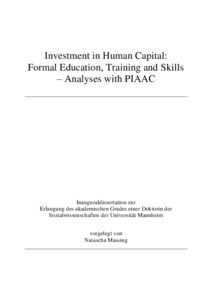|
Investment in human capital: Formal education, training and skills – analyses with PIAAC
Massing, Natascha
![[img]](https://madoc.bib.uni-mannheim.de/66786/1.hassmallThumbnailVersion/Dissertation_NataschaMassing_Druck.pdf)  Vorschau |
|
PDF
Dissertation_NataschaMassing_Druck.pdf
- Veröffentlichte Version
Download (2MB)
|
|
URN:
|
urn:nbn:de:bsz:180-madoc-667861
|
|
Dokumenttyp:
|
Dissertation
|
|
Erscheinungsjahr:
|
2024
|
|
Ort der Veröffentlichung:
|
Mannheim
|
|
Hochschule:
|
Universität Mannheim
|
|
Gutachter:
|
Braun, Michael
|
|
Datum der mündl. Prüfung:
|
20 Februar 2024
|
|
Sprache der Veröffentlichung:
|
Englisch
|
|
Einrichtung:
|
Fakultät für Sozialwissenschaften > Sonstige - Fakultät für Sozialwissenschaften
Außerfakultäre Einrichtungen > Leibniz-Institut für Sozialwissenschaften (GESIS)
|
|
Fachgebiet:
|
300 Sozialwissenschaften, Soziologie, Anthropologie
|
|
Freie Schlagwörter (Englisch):
|
human capital , skills , competencies , literacy , formal education , non-formal education , training
|
|
Abstract:
|
Abstract 1:
Educational qualifications and literacy skills are highly related. This is not surprising as it is one aim of educational systems to equip individuals with competencies necessary to take part in society. Because of this relationship educational qualifications are often used as a proxy for “human capital”. However, from a theoretical perspective, there are many reasons why this relationship is not perfect, and to some degree this is due to third variables. Thus, we want to explore the net relationship between educational attainment (harmonized according to the International Standard Classification of Education, ISCED) and literacy skills, and how much skills vary within education levels across countries.
We use data from 21 countries from the Programme for the International Assessment of Adult Competencies 2012. This paper compares the literacy skills of adults who achieved different levels of educational attainment across countries. Given the high degree of educational differentiation in most countries, we do this using a more differentiated educational attainment variable than what is commonly used. In our analyses we firstly adjust for factors that are likely to affect access to education and the acquisition of educational qualifications and literacy skills, such as parental education and language and migration background. In a second step, we also take into account factors affecting skill development after initial formal education, such as occupation and skill use at home.
We firstly find a high degree of heterogeneity of skills across countries for equivalent education categories. Secondly, we find skill similarities for equivalent education categories classified at different broad education levels, sometimes even breaking the hierarchical order of ‘higher education entails higher competencies’.
We conclude that ISCED levels cannot be taken as a cross-nationally
comparable proxy for human capital in terms of literacy skills, and that education has
to be harmonized in a substantively more meaningful way in future adult literacy
surveys.
Abstract 2:
Lifelong learning is becoming increasingly important in today’s societies. Individuals need to develop their skills through training in order to be successfully integrated in the labor market. We use data from the Programme for the International Assessment for Adult Competencies (PIAAC) to investigate gender differences in training across twelve countries. We analyze participation and perceived barriers to training for women in comparison to men and control for family structure and employment. As institutional framework, we use four different welfare state regimes to show how policies can affect the decision to participate.
Our results show that different welfare regimes have an impact on the extent adults take part in training and on perceived barriers. In all countries except the Nordic states, men are more likely to participate in training. However, this inequality disappears once controlling for further individual characteristics. Our research provides insights why adults are deterred from engaging in training.
Abstract 3:
Migrants in OECD countries have lower chances on the labor market, lower educational attainment, their qualifications from other countries are often not recognized in the host country, or their skills sometimes do not match with the local labor demands. Non-formal education or ‘lifelong learning’ is a possible way to mitigate these problems and address existing inequities. This paper thus analyzes the following key questions: Does training participation vary between migrants and natives? Is it possible to distinguish any patterns across countries? Do the same kind of barriers prevent migrants in comparison to natives from participation in training? Using data from the Programme for the International Assessment of Adult Competencies (PIAAC), I confirm previous findings that migrants participate less in training than natives. These disadvantages, however, tend to disappear in the second generation. I also show that formal educational attainment cannot explain lower training participation of the first generation. A possible explanation is that, compared to those who completed their formal education in the host country, migrants who obtained a comparable degree abroad exhibit lower levels of literacy, which is an important driver of access to training. First generation migrants also more often tend to report financial reasons as barrier to obtaining training. All these findings are relatively robust across different countries and welfare regimes.
|
 | Dieser Eintrag ist Teil der Universitätsbibliographie. |
 | Das Dokument wird vom Publikationsserver der Universitätsbibliothek Mannheim bereitgestellt. |
 Suche Autoren in Suche Autoren in
Sie haben einen Fehler gefunden? Teilen Sie uns Ihren Korrekturwunsch bitte hier mit: E-Mail
Actions (login required)
 |
Eintrag anzeigen |
|
